Stroke risk factors may lead to cognitive problems: Study
Stroke News Friday, November 11th, 2011A study funded by the National Institutes of Health (NIH) has found that high blood pressure and other known risk factors for stroke also increase the risk of developing cognitive problems, even among people who have never had a stroke.
The first author Frederick Unverzagt, PhD, and a professor of psychiatry at Indiana University School of Medicine in Indianapolis, said, “Our results emphasize the importance of early intervention to treat high blood pressure and preserve cognitive health prior to a stroke or other cerebral event.” The study appears in the November 8, 2011 issue of Neurology.
The new findings come from the REasons for Geographic and Racial Differences in Stroke (REGARDS) study, an effort to track stroke risk and cognitive health in an ethnically and demographically diverse sample of the US population 45 and older. Since 2003, the study has followed more than 30,000 people. The study is funded by NIH’s National Institute of Neurological Disorders and Stroke (NINDS) and is led by George Howard, PhD, chair of the biostatistics department at the University of Alabama at Birmingham.
Strokes, which affect some 795,000 Americans each year, occur when blood vessels that supply the brain rupture or become blocked. A stroke can cause a host of cognitive disabilities, including effects on memory, speech and language, and everyday problem solving. But even without suffering a stroke, individuals at risk for stroke may experience cognitive problems as their blood vessels deteriorate.
For this analysis, the REGARDS team collected data on nearly 24,000 study participants who had no history of cognitive impairment or stroke, and no evidence of stroke during the study. At the start, the researchers assessed each person’s stroke risk with the Framingham Stroke Risk Profile, which incorporates risk factors including age, high blood pressure, diabetes and heart problems. They also assessed cognitive health with a six-item screening test that required participants to give the year, month and day, and to remember three items from a list after a short delay. The test was repeated annually, and the average follow-up time was 4.1 years. Read Full Article


